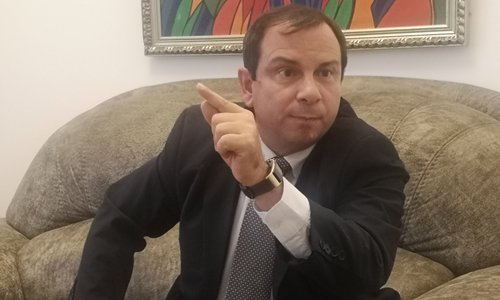Miami Five Hero: Cold War back to haunt Cuba-US relations
Global Times | Wednesday, 14 August 2019 | Click here for original article

Fernando González, president of the Cuban Institute of Friendship
Fernando González, president of the Cuban Institute of Friendship with the Peoples (ICAP), is no doubt the best person to talk about the relations between Cuba and its old foe, the US.
This is because González has another better known identity: a member of the Cuban Five. The Cuban Five/Miami Five, who are hailed as heroes in Cuba, are five Cuban men who were unfairly accused by the US of espionage in Miami and then imprisoned. Some of them served the full sentence and others were released after the two countries established ties in 2014.
González told the Global Times that the cold war has returned to the US and Cuba in a way that is "even more aggressive" than the past.
Dimmed hope
González returned to Cuba several months before his three comrades. The US then agreed to reduce his sentence as a gesture of goodwill.
But he didn't know this back then. When he met his three comrades three months later, he still did not realise that this was part of the ice-breaking consensus that Cuba and the US had agreed upon.
"I was surprised," he told the Global Times, describing his feelings back then.
"It's because I hadn't expected that the two countries could reach such a broad consensus. But like many other Cuban people, I was optimistic and welcoming of it. I thought Cuba and the US would soon see high-level exchanges. And I thought this meant that for Cuban people born in the 1960s like me who are living under US hostility would finally have a life that would not be threatened by the world's most powerful country."
But when US President Donald Trump assumed office in 2017, relations between Cuba and the US deteriorated. What González has expected doesn't turn into reality.
"I cannot say I'm disappointed," he said. "What my personal experiences told me is that the US can do any terrible thing to Cuba."
But he said he did feel a regret as to what the US has done in the recent two years is a "complete reversal," which wasted all efforts and put paid to all achievements that the two countries have had over the past few years.
"Under the US sanctions, ordinary Cuban citizens cannot even buy the daily necessities, such as a roll of toilet paper. Cuban children who have heart diseases cannot receive surgery because the hospitals lack necessary medicines. A child's life is threatened just because of the political agenda," González said with a sigh.
Unfair US system
He told the Global Times that they do not blame ordinary US citizens as they are friendly to Cuba and are not the policymakers. When González was in a US prison and his family members went to visit him, many American people helped his family members find a place to live, and resolved the transportation problems.
Based on his own experiences, he noted to the Global Times that American people are affectionate but they are fed too much negative information. Information on Cuba in Western media is extremely twisted. In the past, the distorted information the US citizens have received about Cuba said the country is an "authoritarian" state and late Cuban revolutionary leader Fidel Castro was a "dictator."
In recent years, the US citizens began to have some information about Cuba's economic reforms, which did help improve Cuba's image. But González doesn't think their good feelings toward Cuba can be a momentum to change the US government's policy toward the country."
"I don't think the US is so democratic," he said.
The current US government does not only "revive" the cold war mentality, but also makes it "stronger and more aggressive," he told the Global Times. "Maybe the cold war between the US and Cuba never truly ended."
Even though, he said that he still has faith that one day the US' Cuba policy will change. This change may not mean the US will give up its hostility toward Cuba. Instead, it may use its economic and cultural influences to change Cuba.
Cuba's economic reform may be a factor that prompted the US to make such changes. "This will be a challenge to Cuba. But we would like to accept it," he said.
"It's because the US is not as democratic as it claims," he explains. "Its judicial system is extremely unfair. I was a witness to it. In the US, if you don't have money, the chance for you to win a lawsuit is virtually zero. But how many people can afford the expensive attorney's fee?"
"What I saw in US prisons is that poor people can only ask other prisoners to help write appellate paper. The only outside help [they have] is four books. Under these circumstances, what are the odds of winning a lawsuit? When a country's media keeps spreading distorted information, how can the jurors make independent judgment? In fact, I haven't seen any rich man in US prisons over the past decade. The majority of prisoners are black people or Latinos. Where is the judicial fairness that the US claims?" he asked.






